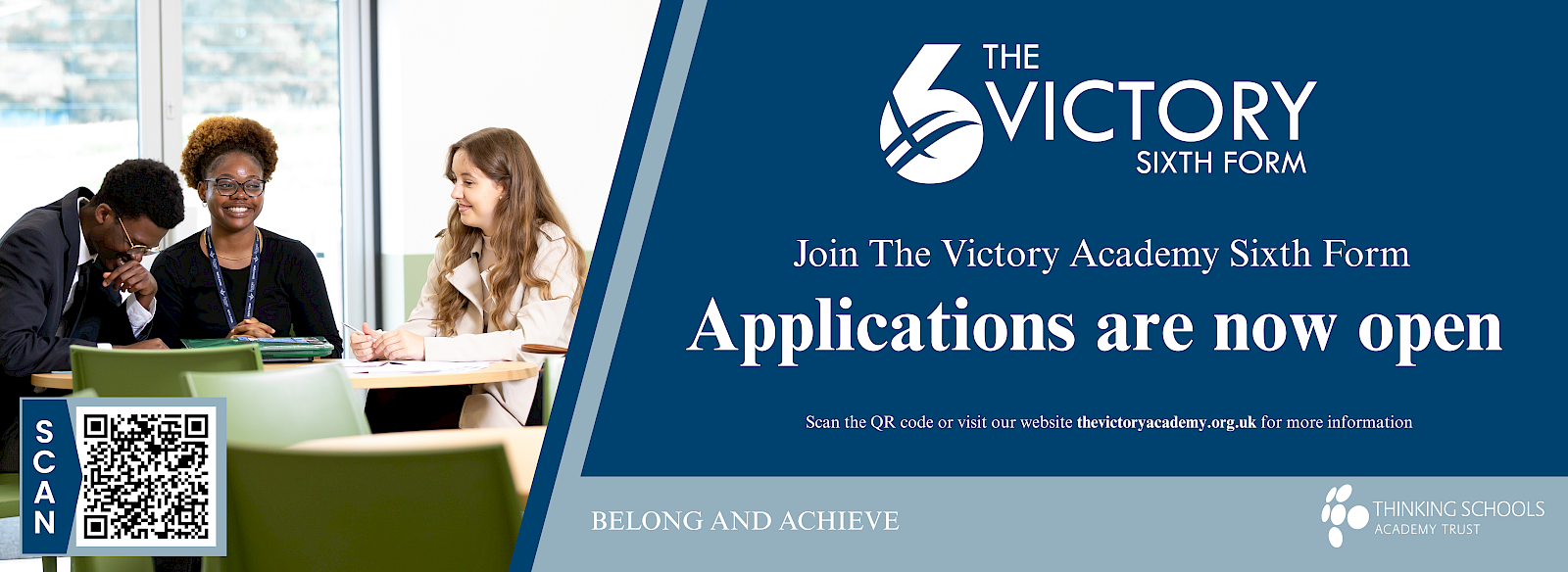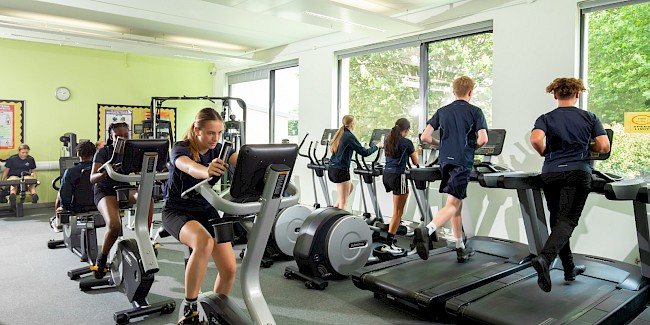
Applications for The Victory Academy Sixth Form are now open! To apply please click here.

Applications for The Victory Academy Sixth Form are now open! To apply please click here.
Year on year, the sports industry shows continued growth in employment and forecasts suggest this trend will continue. This comes from increased knowledge and understanding of the benefits of regular participation in sport and physical activity. Sport England provides well documented research of these benefits including improvements in physical and mental wellbeing, economic development, individual development and social and community development (2020). These contribute significantly to the quality of a person's life and, as such, there is a need to ensure there are sufficient people working in the industry to meet this demand and encourage regular participation.
BTEC Sport is a vocational subject, where qualifications focus on developing sector-specific applied knowledge and practical skills through realistic vocational contexts. Learning at Key Stage 4 builds upon the skills and knowledge of the Core PE Curriculum by studying the BTEC Tech Award (2022) in Sport (equivalent to 1 GCSE). At Key Stage 5 we study the BTEC National Extended Certificate (equivalent to 1 A level) and the BTEC National Diploma in Sport (equivalent to 2 A levels), with both qualifications being recognised by universities.

Within the Vocational Faculty, the aims of the BTEC Sport courses are;
The BTEC Tech Award (2022) covers the following components of learning;
Component 1: Preparing Participants to Take Part in Sport and Physical Activity
Learning outcomes
A - Explore types and provision of sport and physical activity for different types of participant.
B - Examine equipment and technology required for participants to use when taking part in sport and physical activity.
C - Be able to prepare participants to take part in sport and physical activity.
Assessment – by a Pearson Set Assignment (PSA).
Component 2: Taking Part and Improving Other Participants Sporting Performance
Learning outcomes
A - Understand how different components of fitness are used in different physical activities.
B - Be able to participate in sport and understand the roles and responsibilities of officials.
C - Demonstrate ways to improve participants sporting techniques.
Assessment – by a Pearson Set Assignment (PSA)
Component 3: Developing Fitness to Improve Other Participants Performance in Sport and Physical Activity
Assessment objectives
AO1 Demonstrate knowledge of facts, components of fitness, fitness tests, training methods/processes/principles in relation to improving fitness in sport and exercise.
AO2 Demonstrate an understanding of facts, components of fitness, fitness tests, training methods/processes/principles in relation to improving fitness in sport and exercise.
AO3 Apply an understanding of facts, components of fitness, fitness tests, training methods/processes/principles in relation to improving fitness in sport and exercise.
AO4 Make connections with concepts, facts, components of fitness, fitness tests, training methods/processes/principles in relation to improving fitness in sport and exercise.
Assessment – by a written exam.
The BTEC National Extended Certificate in Sport covers the following components of learning;
Unit 1: Anatomy & Physiology
Assessment outcomes
AO1 Demonstrate knowledge of body systems, structures, functions, characteristics, definitions and other additional factors affecting each body system.
AO2 Demonstrate understanding of each body system, the short- and long-term effects of sport and exercise on each system and additional factors that can affect body systems in relation to exercise and sporting performance.
AO3 Analyse exercise and sports movements, how the body responds to short-term and long-term exercise and other additional factors affecting each body system.
AO4 Evaluate how body systems are used and how they interrelate in order to carry out exercise and sporting movements.
AO5 Make connections between body systems in response to short-term and long-term exercise and sport participation. Make connections between muscular and all other systems, cardiovascular and respiratory systems, energy and cardiovascular systems Command words: analyse, assess, discuss, evaluate, to what extent.
Assessment – external written exam.
Unit 2: Fitness Training & Programming for Health, Sport and Wellbeing
Assessment outcomes
AO1 Demonstrate knowledge and understanding of the effects of lifestyle choices on an individual’s health and well-being.
AO2 Apply knowledge and understanding of fitness principles and theory, lifestyle modification techniques, nutritional requirements and training methods to an individual’s needs and goals.
AO3 Analyse and interpret screening information relating to an individual’s lifestyle questionnaire and health monitoring tests.
AO4 Evaluate qualitative and quantitative evidence to make informed judgements about how an individual’s health and well-being could be improved.
AO5 Be able to develop a fitness training programme with appropriate justification.
Assessment – external written exam.
Unit 7: Practical Sports Performance
Learning Aim
A – National Governing Body rules, laws and regulations.
B – Skills, techniques and tactics.
C – Develop skills, techniques and tactics.
D – Reflect on own practical performance using selected assessment methods.
Assessment – internal assessment.
Unit 3: Professional Development in the Sports Industry
Learning Aim
A – Understand the career and job opportunities in the Sports Industry.
B – Explore own skills using a skills audit to inform a career development action plan.
C – Undertake a recruitment activity.
D – Reflect on recruitment process and selection process and your performance.
Assessment – internal assessment.
In addition to the above units, the BTEC National Extended Diploma in Sport covers the following components of learning;
Unit 4: Sports Leadership
Learning Aim
A – Understand the roles, qualities and characteristics of an effective sports leader.
B – Examine the importance of psychological factors and their link with effective leadership.
C – Explore an effective leadership style when leading a team during sport and exercise activities.
Assessment – internal assessment.
Unit 5: Application of Fitness Testing
Learning Aim
A – Understand the principles of fitness testing.
B – Explore fitness tests for different components of fitness.
C – Undertake evaluation and feedback of fitness test results.
Assessment – internal assessmen.t
Unit 18: Work Experience in Active Lesuire
Learning Aim
A – Undertake in-depth preparation for an active leisure work experience placement.
B – Undertake a job application process for an active leisure work experience placement.
C – Carry out work experience tasks to meet set objectives from work experience action plan.
D - Investigate the impact of an active leisure work experience placement on career development.
Assessment – internal assessment.
Unit 22: Investigating Business in the Sport and Active Leisure Industry
Assessment outcomes
AO1 Demonstrate knowledge and understanding of sport and active leisure business operations and how to respond to trends and internal and external influences.
AO2 Analyse and interpret business information and data, and their potential impact and influence on a sport and active leisure business.
AO3 Evaluate evidence to make informed judgements on how a sport and active leisure business should be developed, diversified or adapted. AO4 Be able to make justified recommendations for a sport and active leisure business, synthesising ideas and evidence from several sources to support arguments.
Assessment – external written exam.
Unit 23: Skill Acquisition in Sport
Learning Aim
A – Investigate the nature of skilled performance.
B – Examine ways that sport performers process information for skilled performance.
C – Explore theories of teaching and learning in sport.
D - Carry out teaching and learning strategies for sports skills.
Assessment – internal assessment.





A BTEC in Sport develops the skills and confidence needed to progress into a fulfilling, exciting career in the Sports Industry. The sport and fitness industries are always moving and changing, making it essential for learners to have the drive and resilience to adapt. The combination of practical and academic skills develops teamwork, independence and organisation skills that are important in all occupations, not just in the Sports industry.
The following lists some examples of the wide range of careers in the Sports and Fitness Industry;
There are many websites dedicated to finding a career in Sport. Here are some examples;
Careers in Sport - https://careers-in-sport.co.uk/jobs/
Jobs in Sport - https://www.uksport.gov.uk/jobs-in-sport
Target Careers - https://targetcareers.co.uk/careers-advice/choosing-your-career/1034364-careers-in-sports
National careers Service - https://nationalcareers.service.gov.uk/job-categories/sports-and-leisure
Global Sports Jobs - https://www.globalsportsjobs.com/
Sports careers Agency - https://sportcareersagency.com/
www.1st4sport.com – Coachwise
www.acsm.org – American College of Sports Medicine
www.bases.org.uk – The British Association of Sport and Exercise Sciences
www.heart.org – American Heart Association www.humankinetics.com – Human Kinetics www.nhs.uk – National Health Service
www.sportsci.org – Sport Science
www.sportscoachuk.org – Sports Coach UK
www.topendsports.com – Topend Sports
www.acsm.org – American College of Sports Medicine – health, fitness and nutrition articles
www.bbc.co.uk – BBC – healthy living
www.bhf.org.uk – British Heart Foundation – health, lifestyle, nutrition, hydration, heart disease, exercise, food labelling, questionnaires, smoking
www.brianmac.co.uk – BrianMac – sports drinks, fitness testing, training, programming
www.bupa.co.uk – BUPA – benefits of exercise, children and exercise
www.doh.gov.uk – Department of Health – obesity, healthy eating, initiatives, factsheets for government recommendations for physical activity (various age groups)
www.food4life.org.uk – Food4life – eatwell plate, food groups
www.livestrong.com – Livestrong – effects of poor nutrition
www.macmillan.org.uk – Macmillan – benefits of exercise, maintaining a healthy lifestyle and getting active